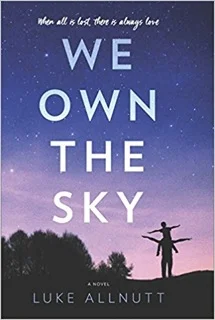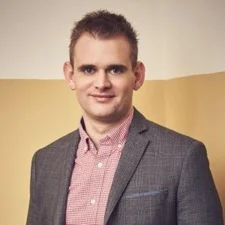Read an excerpt from We Own the Sky by Luke Allnutt
/“We looked down at the cliff jutting into the sea, a rubber boat full of kids going under the arch, and then you started running and jumping through the grass, dodging the rabbit holes, shouting at the top of your voice, so I started chasing you, trying to catch you, and we were laughing so hard as we ran and ran, kicking up rainbow showers in the leaves.”
Rob Coates feels like he’s won the lottery of life. There is Anna, his incredible wife, their London town house and, most precious of all, Jack, their son, who makes every day an extraordinary adventure. But when a devastating illness befalls his family, Rob’s world begins to unravel. Suddenly finding himself alone, Rob seeks solace in photographing the skyscrapers and clifftops he and his son Jack used to visit. And just when it seems that all hope is lost, Rob embarks on the most unforgettable of journeys to find his way back to life, and forgiveness.
We Own the Sky is a tender, heartrending, but ultimately life-affirming novel that will resonate deeply with anyone who has suffered loss or experienced great love. With stunning eloquence and acumen, Luke Allnutt has penned a soaring debut and a true testament to the power of love, showing how even the most thoroughly broken heart can learn to beat again.
Excerpt
I flick through Facebook, squinting my eyes so I can see the screen. My profile is barren, without pictures, just a silhouette of a man, and I never “liked” or commented or wished anyone happy birthday, but I was there every day, scrolling, judging, scrolling, judging, dank little windows into the lives of people I no longer knew, with all their sunrises and sunsets, their cycle trips through the Highlands, the endless stream of Instagrammed pad Thai and avocado toast, the unfathomable smugness of their sushi dinners.
I take a deep breath, then a swig each of beer and vodka. I pity them. All those tragedy whores, with their tricolors and rainbows, changing their profile pics to whatever we are supposed to care about today—the refugees, the latest victims of a terror attack in some godforsaken place. All their hashtags and heartfelt posts about “giving” because they once helped build a school in Africa on their gap year and kissed a beggar’s brown hand with their pearly white mouth.
I change my position at the table so I can see the girl at the bar. She has ordered another drink and is laughing, almost cackling, as she watches a video on her phone, pointing at it, trying to get the barmaid’s attention.
I go back to my phone. Sometimes I force myself to look at the photos of other people’s children. It is, I suppose, like the urge to pick at a newly formed scab, not letting up until there is a metallic blush of blood. The stomach-punches of new arrivals, gap-toothed kids starting school, with their satchels and oversize blazers; and then their beach holidays, with their sand castles and moats, and ice creams dropped in the sand. Big shoes and little shoes, lined up on the mat.
And then the mothers. Oh those Facebook mothers. The way they talked, as if they had invented motherhood, as if they had invented the womb, telling themselves they were different from their own mothers because they ate quinoa and had cornrows in their hair and ran a Pinterest board on craft ideas for the recalcitrant under-fives.
I walk back to the bar and stand close to the drunk woman. With enough drink inside me, I feel better now and my hands have stopped shaking. I smile and she stares back, wobbling on her stool, looking me up and down.
“Would you like a drink?” I say, cheerfully, as if we already know each other.
In her glazed eyes, there is a flicker of surprise. She forces herself to sit up straight, so she is no longer slumped over the bar.
“Rum and Coke,” she says, her swagger returning, and she turns away from me, tapping her fingers on the bar.
As I am ordering the drinks, she pretends to be doing something on her phone. I can see her screen, and she is just randomly flicking between applications and messages.
“It’s Rob, by the way,” I say.
“Charlie,” she says. “But everyone calls me Charls.”
“You’re local?” I ask.
“Camborne, born and bred,” she says, swiveling her body to face me. “But I’m staying with my sister up here now.” Her eyes are like lizard tongues, darting toward me when she thinks I’m not looking.
“You’ve probably never heard of Camborne, have you?”
“Mining, right?”
“Yeah. Not anymore though. My dad worked at South Crofty, till it were closed,” she says and I notice how Cornish she sounds. The fading inflection, the soft rolled r’s.
“And you?”
“London.”
“London. Very nice.”
“Do you know London?”
“Been there once or twice,” she says, looking away again to the other end of the bar, taking a deep drag of her cigarette.
She is younger than I thought, midtwenties, with red-brown hair and soft, childish features. There is something vaguely unhinged about her, something I can’t place, that goes beyond the drink, beyond the smudges around her eyes. She seems out of place in The Smugglers, as if she has ducked out of a wedding party and ended up here.
“Down here on your holidays then?”
“Something like that.”
“So you like Tintagel then?” she asks.
“I only arrived today. I’ll go to the castle tomorrow. I’m staying in the hotel next door.”
“First time here then?”
“Yes.”
It is a lie, but I cannot tell her about the time we were here before. The three of us, the end of a wet British summer, wrapped up against the wind, raincoats over shorts. I remember how Jack charged around on the grass next to the parking lot and how fearful Anna was— “hold hands, Jack, hold hands”—in case he got too close to the edge. I remember how we walked up the steep, winding path and came to the top of the cliff, and then, out of nowhere, there was a break in the weather, an almost biblical respite, as the rain stopped, the clouds parted and a rainbow appeared.
“Rainbow, rainbow,” Jack shouted, hopping from foot to foot, the leaves dancing around him like fire sprites. Then, it was as if something touched him, or someone whispered in his ear, and he stood still, looking up through the column of light that pierced the clouds, as the rainbow faded into the blue sky.
Buy on Amazon | Barnes and Noble
About the Author
















































